2025 Forum on Women in Agrifood held in Beijing, exploring pathways for technology to empower women
Chinagate.cn By Xu Lin and Jin Ling, October 16, 2025 Adjust font size:
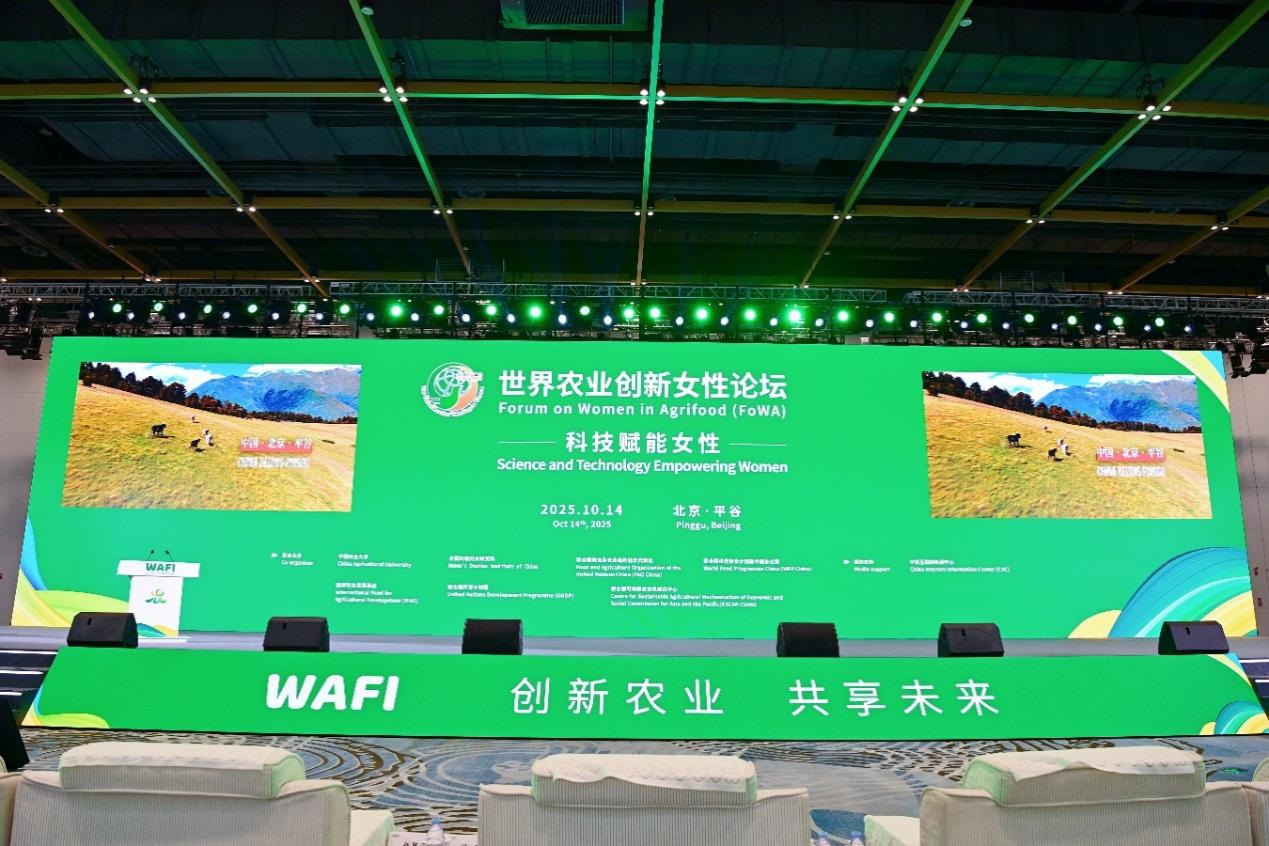
The Forum on Women in Agrifood (FoWA), part of the 2025 World AgriFood Innovation Conference (WAFI), is held in Pinggu district, Beijing on Oct. 14. [Photo by Shi Yuhang / China Women's News]
On the morning of Oct. 14, the Forum on Women in Agrifood (FoWA), part of the 2025 World AgriFood Innovation Conference (WAFI), was held in Pinggu district, Beijing. Feng Ling, vice president and member of the secretariat of the All-China Women’s Federation (ACWF), and Sun Qixin, president of China Agricultural University (CAU), delivered opening speeches. Representatives from United Nations agencies in China, other international organizations, and academia attended in person or online.
Focused on “Science and Technology Empowering Women,” the forum was co-hosted by CAU, the Women’s Studies Institute of China (WSIC) under the ACWF, the Food and Agriculture Organization of the United Nations (FAO) Representation in China, the World Food Programme (WFP) China Office, the International Fund for Agricultural Development (IFAD), the United Nations Development Programme (UNDP), and the Centre for Sustainable Agricultural Mechanization of the United Nations Economic and Social Commission for Asia and the Pacific (ESCAP-CSAM). The China Internet Information Center (CIIC), as a media outlet, provided publicity support for the forum.
The forum invited representatives from 20 different institutions including international organizations, agricultural enterprises, universities and research institutes to hold in-depth discussions. More than 200 people attended the event on site, and nearly half of the participants came from different countries and regions. The online live broadcast was watched by over one million people.
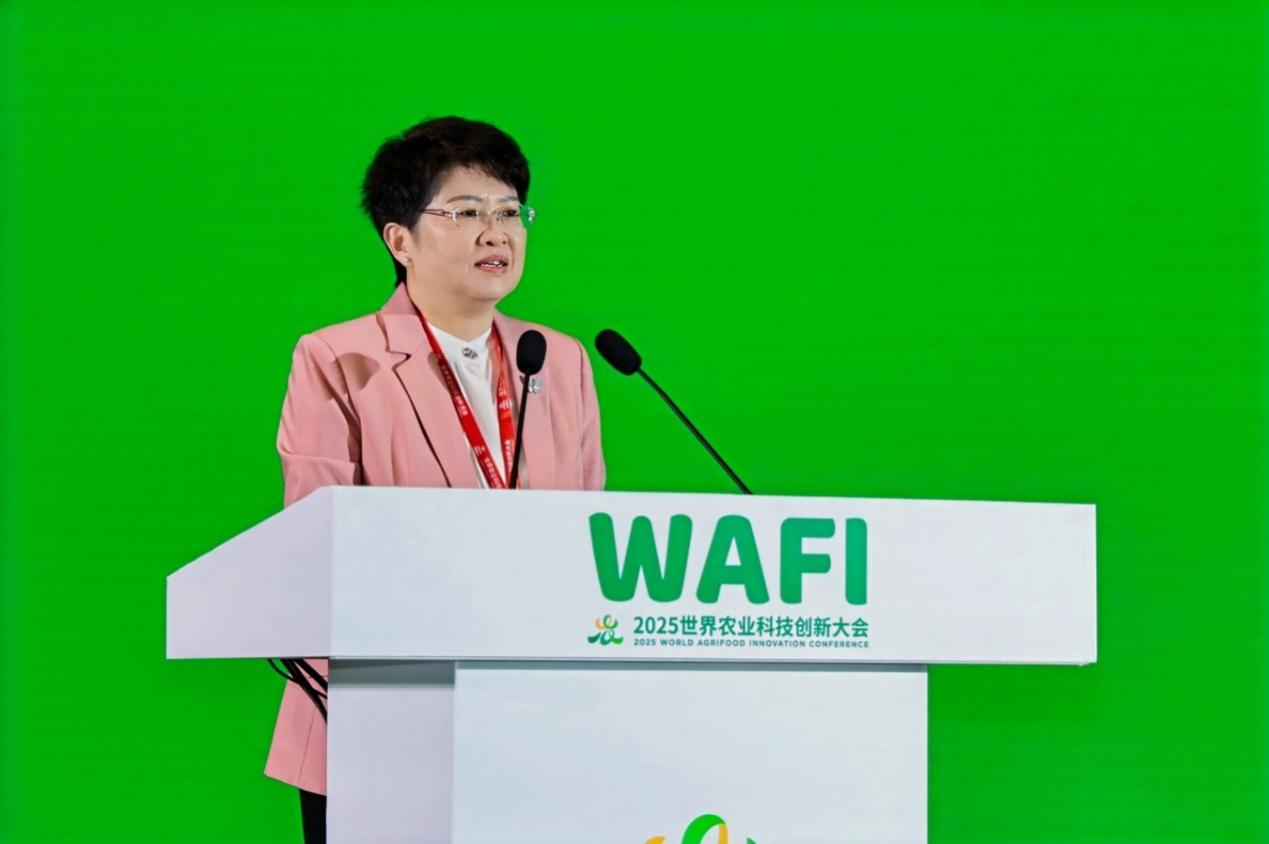
Feng Ling, vice president and member of the secretariat of the All-China Women’s Federation, delivers an opening speech at the Forum on Women in Agrifood.
Feng Ling, vice president and member of the secretariat of the ACWF, highlighted in her opening speech that women are a central force in driving agricultural innovation and rural vitalization. The Chinese government has taken a series of strong measures and actions to promote the all-round development of rural women, helping them overcome absolute poverty, empowering them through training, supporting their entrepreneurship and employment through inclusive finance, trying hard to eliminate gender and urban–rural disparities, and ensuring that rural women can participate equally in agricultural production and rural development and share the fruits of high-quality rural modernization. China’s agricultural assistance projects injected impetus into the agricultural development of many developing countries and also opened up space for women to participate in agricultural production activities. Feng also called for joint efforts with global partners to promote sustainable agricultural development, inject women’s strength into ensuring food security, and advance the achievement of the United Nations 2030 Sustainable Development Goals.
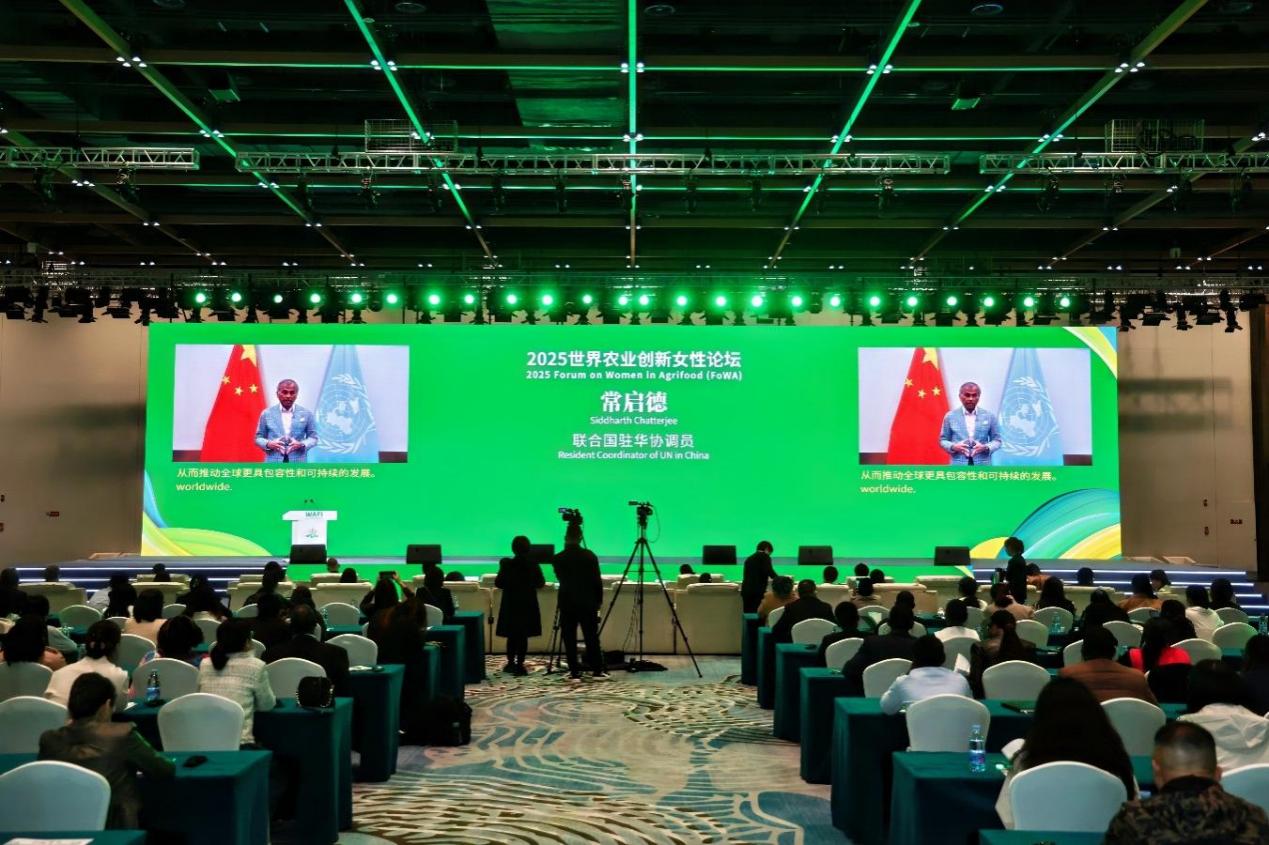
A pre-recorded video message by Siddharth Chatterjee, resident coordinator of UN in China, is delivered on screen during the Forum on Women in Agrifood.
“In today's rapidly evolving world, digital tools, smart agriculture, and innovative platforms are transforming rural economies,” noted Siddharth Chatterjee, resident coordinator of UN in China in his video address. “They allow women to enhance productivity, increase incomes, and step forward as leaders for agricultural transformation, rather than remaining on the margins as beneficiaries.” He also highlighted three critical topics for the future development of women in agriculture: 1) How can policies and technologies be designed to close persistent gender gaps in agriculture? 2) How do we amplify women's leadership in shaping resilient and sustainable food systems? 3) And how can multi-stakeholder partnerships accelerate progress, scaling up solutions that already work? These questions provide valuable insights for research, practice, policymaking, and dialogue on gender and development.
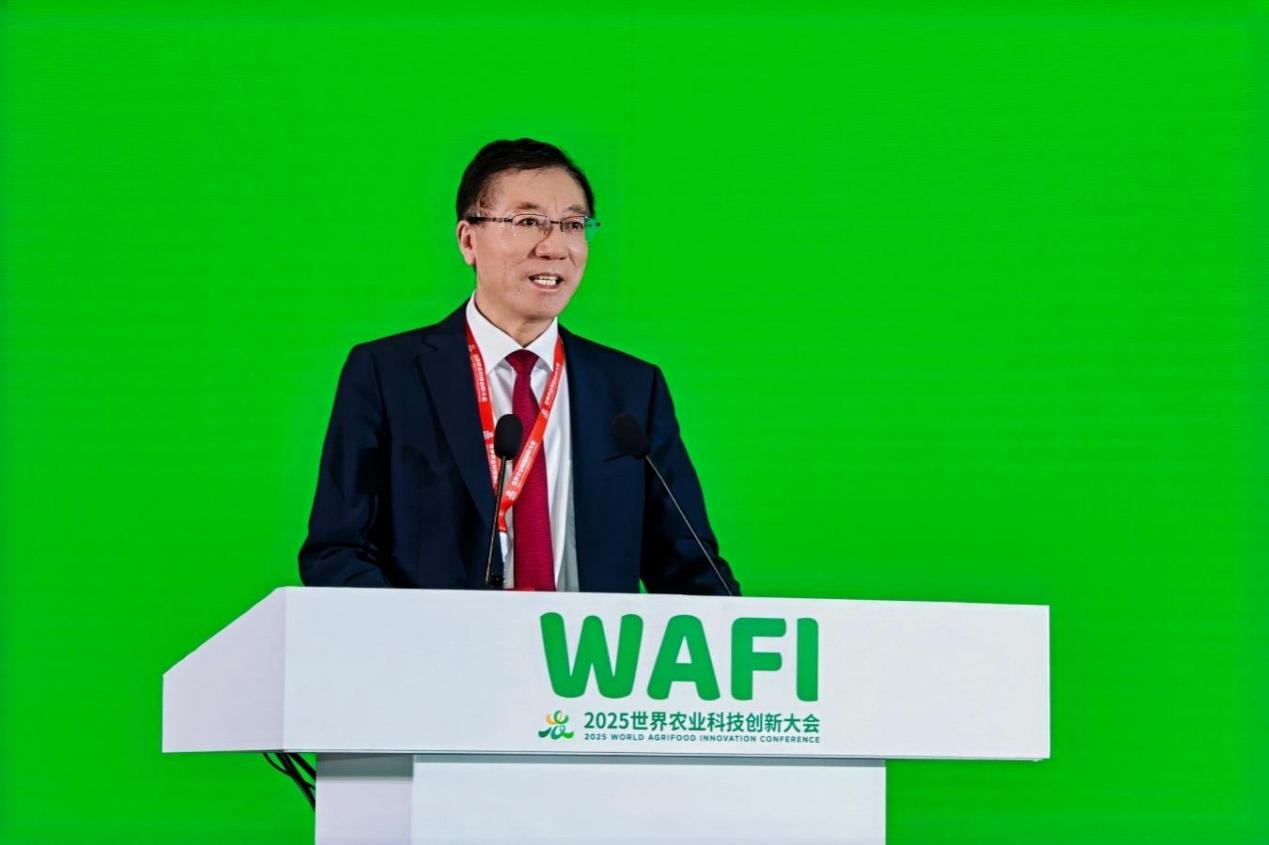
Sun Qixin, president of China Agricultural University, delivers an opening speech at the Forum on Women in Agrifood.
Sun Qixin, president of CAU, remarked that the continuous convening of the FoWA this year carries great significance, as it coincides with the 30th anniversary of the Fourth World Conference on Women. He pointed out that Chinese women have become an indispensable force in rural vitalization and the building of a strong agricultural nation, demonstrating unique wisdom and resilience in promoting the green transformation of agriculture and technological innovation. Notably, women, with their unique subtlety, have injected vigor and vitality into the "living" transmission of national culture, turning local resources into cultural products that are well received by the market and injecting sustainable momentum into rural development. He called for building global consensus to promote technological empowerment and gender equality, jointly create platforms for women’s practice and innovation, and work together to promote global food security and the realization of the Sustainable Development Goals.
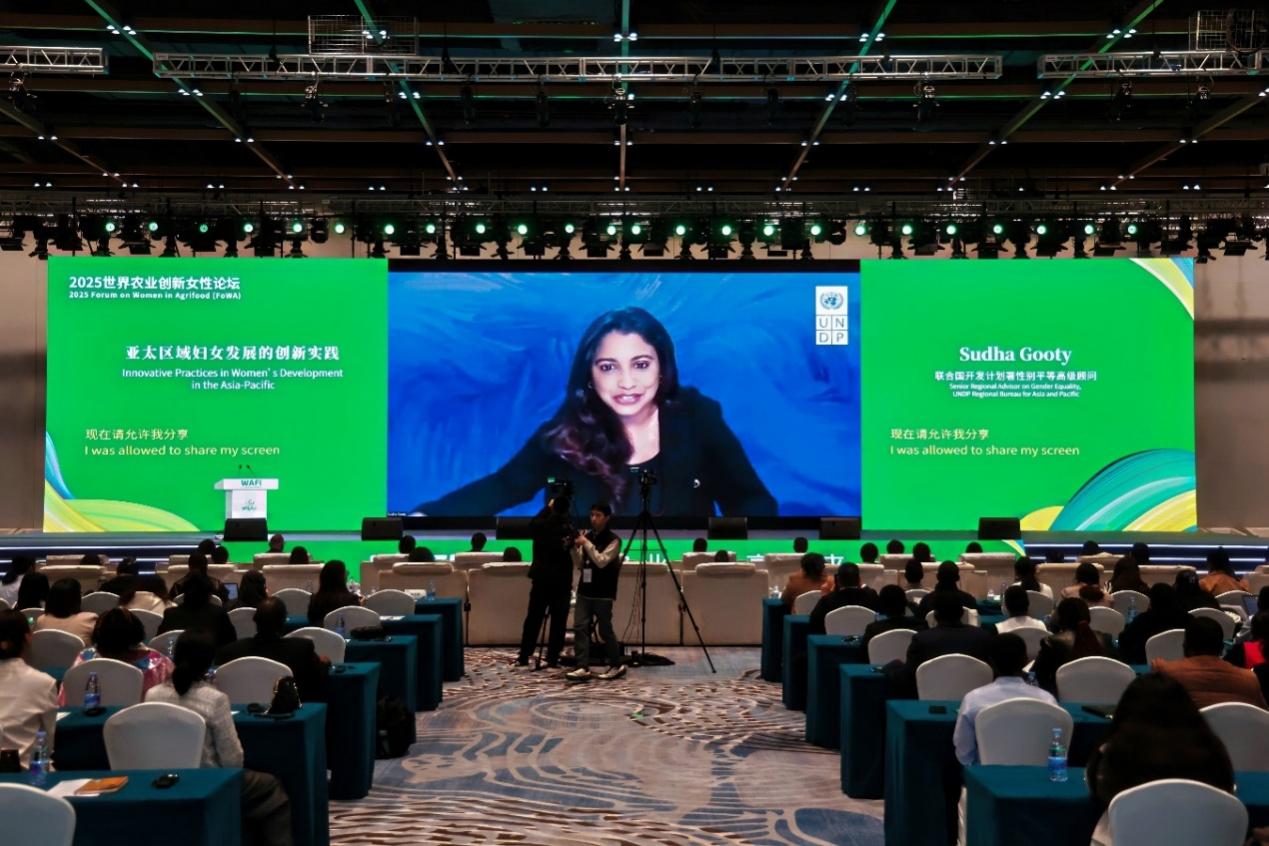
A pre-recorded video keynote speech by Sudha Gooty, senior regional advisor on gender equality, UNDP Regional Bureau for Asia and Pacific, is delivered on screen during the Forum on Women in Agrifood.
During the keynote speech session, Sudha Gooty, senior regional advisor on gender equality, UNDP Regional Bureau for Asia and Pacific, gave a comprehensive introduction to the six innovative initiatives of UNDP in promoting women’s development and gender equality, and concluded: “Thirty years after the Beijing Platform for Action, I think the message for all of us is very clear that every policy, every investment, and every innovation in our agri-food systems has to be gender responsive by design and action. And we have to scale proven models, not just investing in women as target groups, but really as co-creators of climate solutions and architects of food security.”
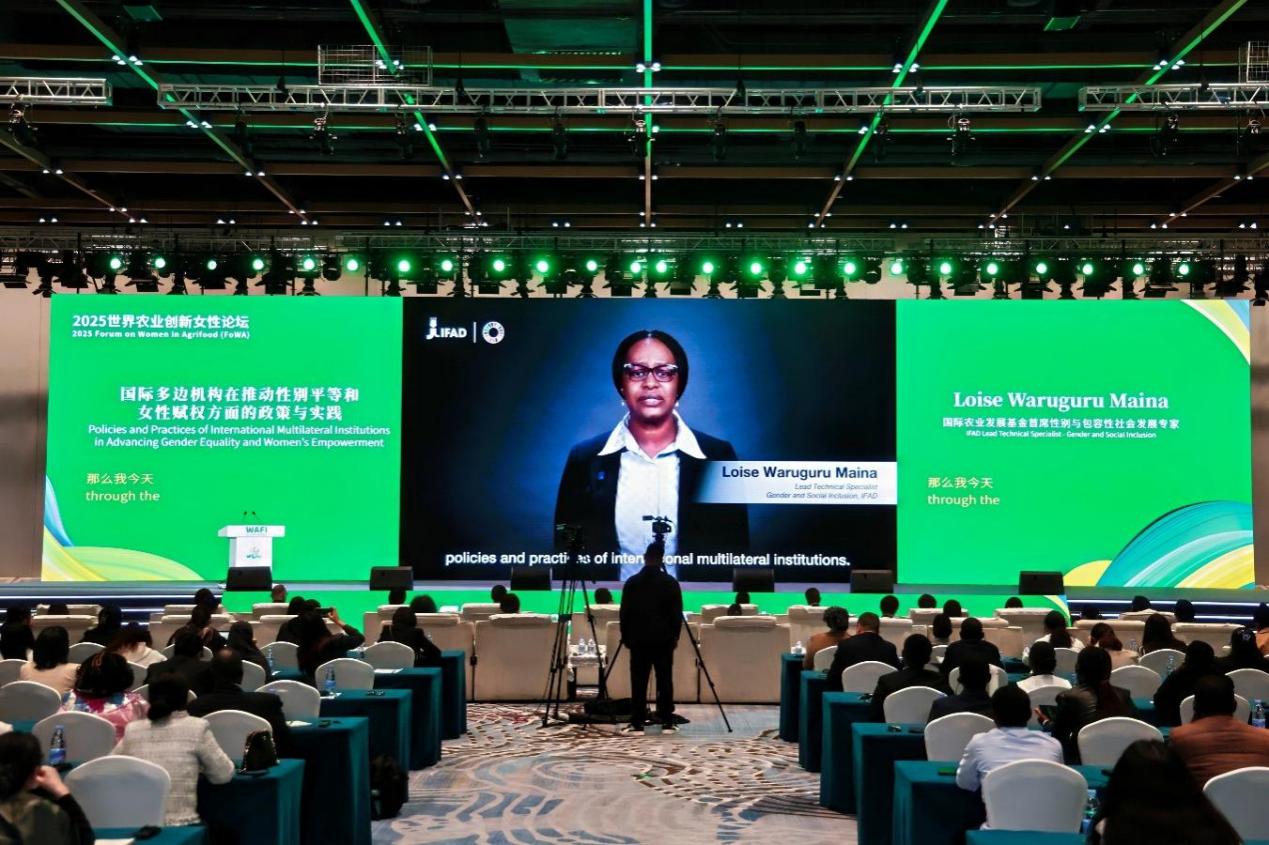
A pre-recorded video keynote speech by Loise Waruguru Maina, IFAD’s lead technical specialist for gender and social inclusion, is delivered on screen during the Forum on Women in Agrifood.
Loise Waruguru Maina, IFAD’s lead technical specialist for gender and social inclusion, mentioned in her video address that policies that promote gender equality not only enable women to advance but, more importantly, make a positive contribution to broader development issues. She supported this with a set of data showing that narrowing gender gaps in agricultural productivity and wages could raise global GDP by 1%, and would lift 45 million people out of hunger. She stressed, “Empowering rural women is not only the right thing to do — it is also the smart thing to do, because when women thrive, entire households and communities prosper.” She also introduced the gender tools and related initiatives of the IFAD, with special mention of their projects in China’s Hunan Province, carried out in collaboration with the ACWF and other United Nations agencies, as well as the positive outcomes achieved.
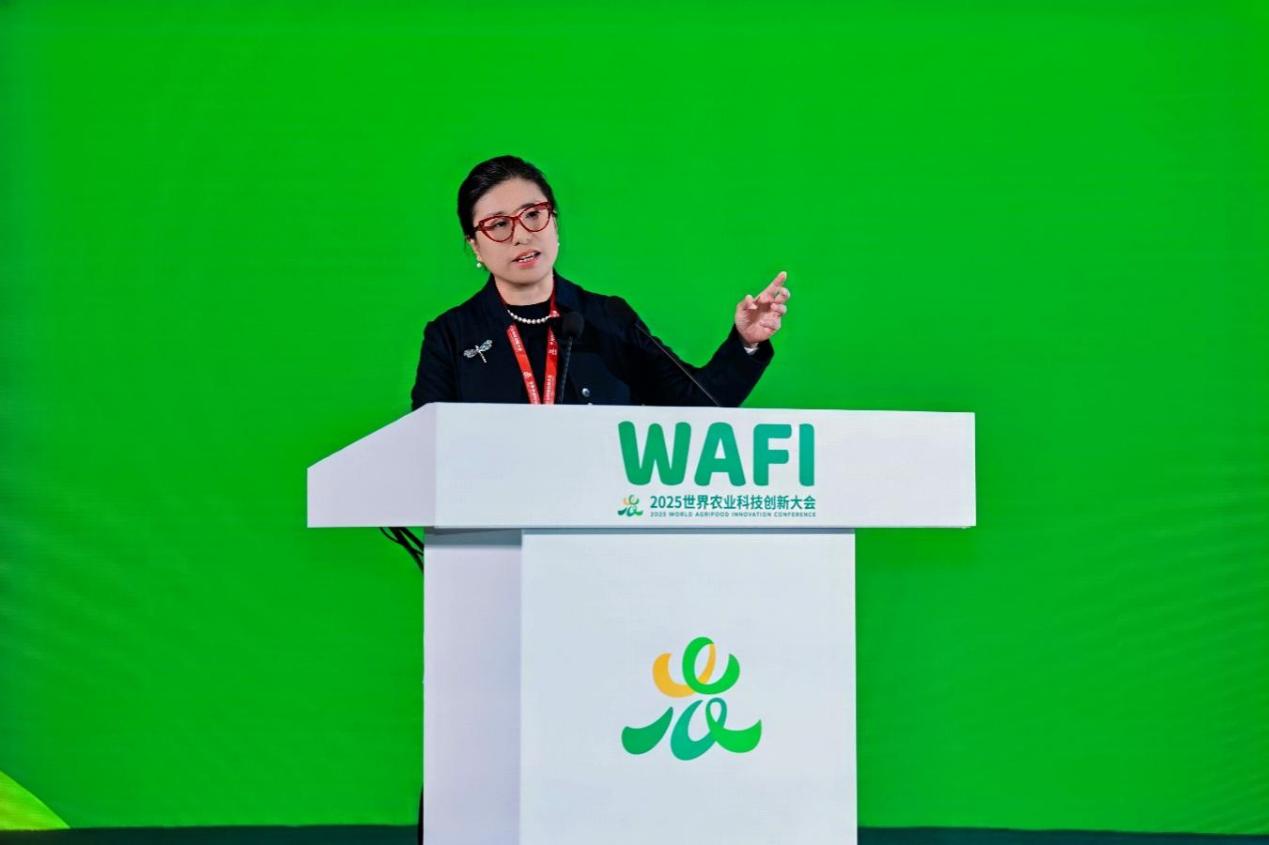
Wang Binbin, researcher at the Institute of Carbon Neutrality of Peking University, delivers a keynote speech at the Forum on Women in Agrifood.
Wang Binbin, researcher at the Institute of Carbon Neutrality of Peking University, noted that Chinese women have shown great potential and made unique contributions in addressing the urgent issue of climate change. At the same time, they also face certain cognitive challenges and have room for further improvement. She noted that women’s awareness of the carbon neutrality goal is significantly lower than that of men, and across all income levels, men’s awareness rates are higher than women’s. This reflects a typical phenomenon of “income-amplified gender disparity,” which describes how gender inequality is worsened by income levels, influenced by factors like unequal economic opportunities, gendered career choices, and different patterns of work and caregiving responsibilities that can be more pronounced in higher-income settings, indicating that men are more likely to perceive the benefits of the transition, while women tend to take a more cautious stance. Therefore, it is necessary to establish gender-differentiated policy communication mechanisms.
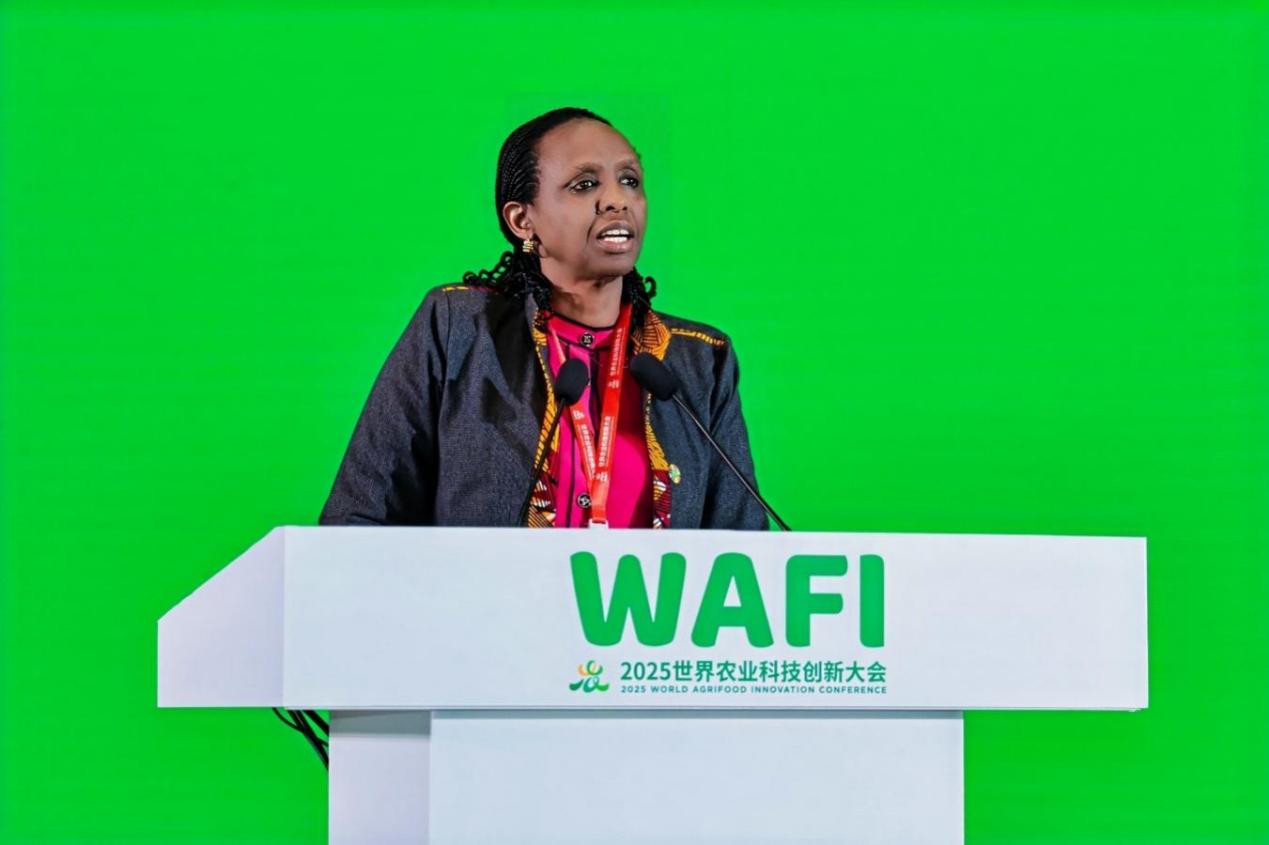
Agnes Kalibata, founder and chair of the Connect for Impact Advisory Group and president emeritus of the Alliance for a Green Revolution in Africa, delivers a keynote speech at the Forum on Women in Agrifood.
Agnes Kalibata, founder and chair of the Connect for Impact Advisory Group (C4Impact Advisory Group) and president emeritus of the Alliance for a Green Revolution in Africa (AGRA), shared examples of women from countries such as Tanzania and Malawi, who have not only advanced their own development but also driven progress within their communities. She emphasized the need to continue supporting women’s participation in business activities, including providing access to land, financing, and technology. She also called on governments and public organizations to take action—investing in and supporting more research on women’s development issues, and providing richer public goods to better address women’s needs in their development process.
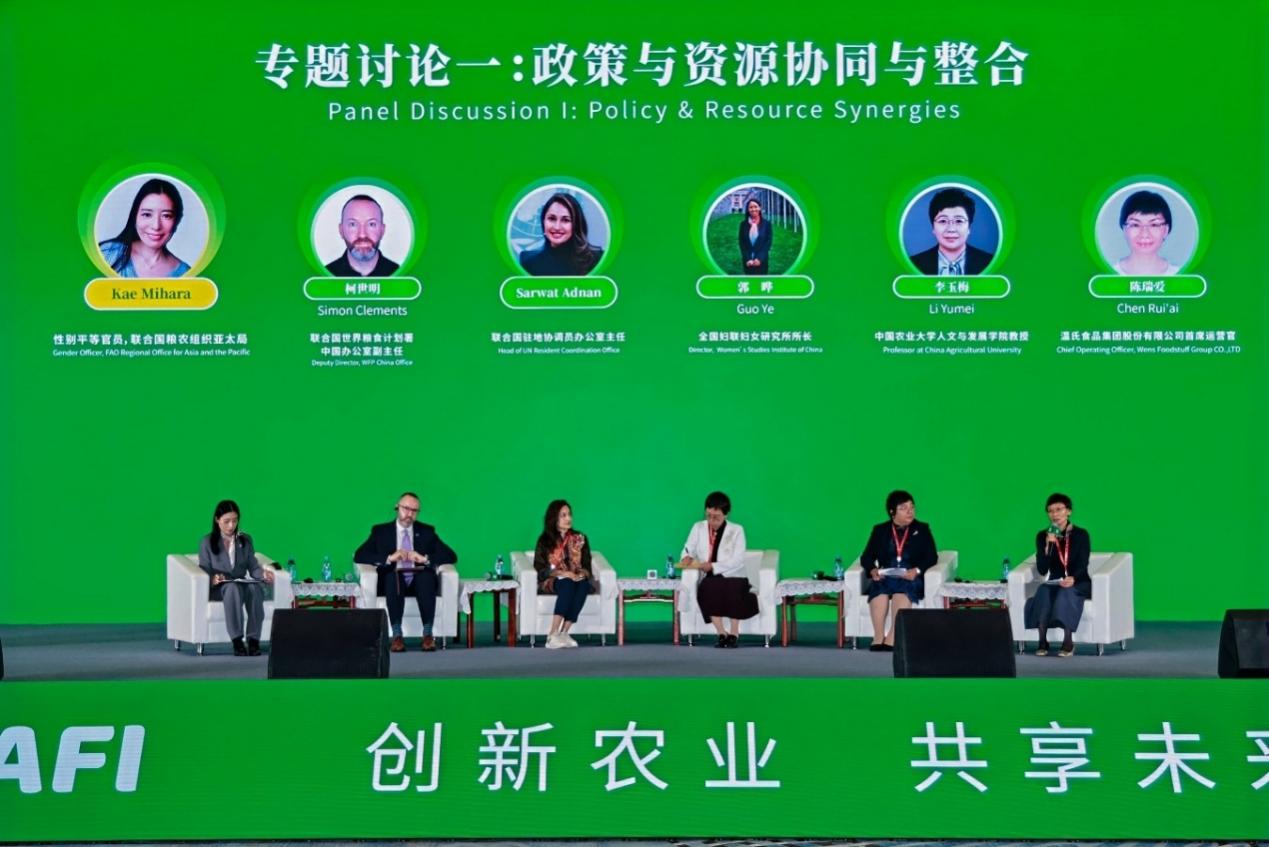
Participants engage in Panel Discussion I: Policy & Resource Synergies of the Forum on Women in Agrifood.
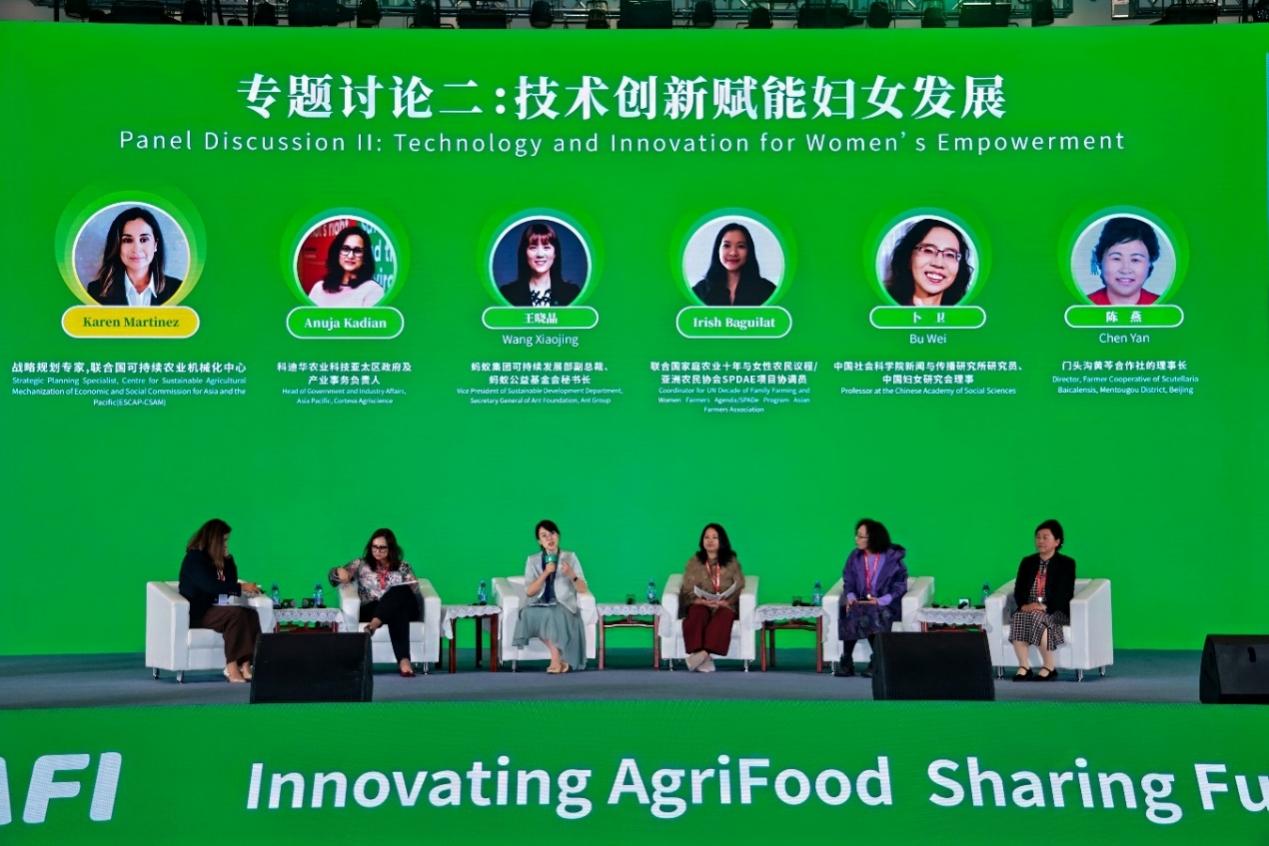
Participants engage in Panel Discussion II: Technology and Innovation for Women’s Empowerment of the Forum on Women in Agrifood.
During the two panel discussions themed “Policy & Resource Synergies” and “Technology and Innovation for Women’s Empowerment,” experts and scholars from organizations including WFP, the Office of the UN Resident Coordinator in China, WSIC of the ACWF, CAU, and the Chinese Academy of Social Sciences—along with representatives from enterprises such as Wens Foodstuff Group, Corteva Agriscience, Ant Group, and Farmer Cooperative of Scutellaria Baicalensis, Mentougou district, Beijing—engaged in in-depth dialogue to share practices, experiences, and innovative solutions.